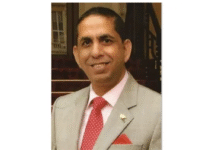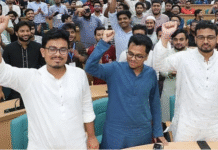POLITICS is in free fall. Governance is under siege. The country is in steep decline. Governments around the world are worried. The United Nations observes it all, sends its representative to speak to our politicians, to little avail. Diplomats from nations as diverse as India and the United States and China watch with consternation the dilemma we are up against. The European Union is in little mood to send observers to oversee our elections, for there is little sign of elections being conducted through a normal, peaceful process of voting.
We as a nation may not yet have turned into a laughing stock before the rest of the world. We may yet be at a remove from becoming a global backwater. But we cannot say for certain that we are not headed in that direction. If a sovereign nation needs, more than four decades after its liberation, the assistance of foreign governments and global organisations to find solutions to its indigenous political problems, you tend to ask yourself where it all began to go wrong and especially in these twenty years since the toppling of the last military regime in the country.
Sit back and reflect on what might have been had mistakes, huge ones, not been made after February 1991.
An embarrassment came through the systematic way in which a by-election in Magura was rigged in 1994 by the BNP government. After all the years spent in a struggle for a restoration of democracy, it was fair enough to suppose that Bangladesh was on a proper constitutional course, that elections in the country would be conducted fairly and freely with nary a thought to the manipulations such exercises could fall prey to.
The Magura by-election justifiably aroused the ire of the opposition Awami League, indeed of the nation by and large. It ignited new forest fires, particularly when the Awami League initiated a boycott of parliament. What followed was a protracted war of attrition, with the Awami League demanding a re-introduction of the caretaker system that had presided over the transition to democratic government in early 1991. Sir Ninian Stephen’s entry into the Bangladesh political arena was an early hint of the increasing role foreign governments and personalities would play should our politicians fail to get their act together.
In the event, the Commonwealth, whose representative Sir Ninian was, failed to convince Bangladesh’s politicians about a need to promote democracy in sustained, non-partisan manner. That failure led quickly to another, through the government of Prime Minister Khaleda Zia going ahead with a general election boycotted by all major opposition groups and parties in the country. Much as one might argue that the February 15, 1996, elections needed to be gone through in the larger interest of a sustained and strong parliamentary system, the fact remains it was an election that opened the door to future darkness. If a ruling party could go ahead with elections a major section of the parliamentary opposition stayed away from, it was a sign that the future was fraught with danger.
Other mistakes were made once the BNP, having become a bad loser at the election of June 1996, turned its back on parliament and gave every sign of its distinct discomfort in being on the opposition benches in the legislative body. It copied the Awami League when it began to stay away from sessions of parliament. The leader of the opposition was clearly unable to perform her role in the Jatiyo Sangsad, for she preferred not to be in the House much of the time. Within the House itself, recriminations, abusive language and walk-outs, in the brief periods when the opposition made its appearance, prevented the growth of a mature democratic order in the country.
The mistakes were nurtured in the parliament that the BNP dominated once the October 2001 election returned it to power. Added to those blunders was the fury with which the party’s activists began to persecute members of the Hindu community and Awami League activists in various parts of the country. For the Awami League, a boycott of the Jatiyo Sangsad was once again in order, a responsibility it did not shirk from. Come August 2004. The well-planned attack on an Awami League rally, leading to the death of as many as twenty two individuals and causing injuries to scores of others, was a crisis the BNP government failed to handle to public satisfaction. A destruction of evidence and a shocking inclination to blame everyone but itself for the security lapse eroded the Khaleda Zia government’s credibility. A year later, the coordinated explosions in 63 of 64 districts by Islamic militants sullied the government’s reputation further.
A huge mistake in the years between 2001 and 2006 was the growth of a Hawa Bhaban culture that effectively gave rise to a parallel centre of power run by the prime minister’s elder child. Add to that the steady corruption which marred the country’s image at home and abroad. Attempts to bring about changes in such historical documents as the Proclamation of Independence, to have a pliant Election Commission make voters out of dead people, to go into a state of denial on every instance of wrongdoing wrecked the government from within and without.
The Awami League, in those BNP years, made the mistake of carrying on a sustained campaign against Justice K.M. Hasan’s taking over as chief advisor of the government-to-be in October 2006. But the ammunition for such protests had come from the BNP administration when it raised the age of retirement for judges by two years, leading to suspicions of intended manipulation of election results.
A colossal blunder, one that led to a suspension of democracy and elected government for close to two years, was President Iajuddin Ahmed’s assumption of office as Chief Advisor in October 2006 without going through the proper constitutional requirements necessary before he could take over. His eventual withdrawal from this office paved the way for the Fakhruddin Ahmed government to come in with aplomb.
Following the election of December 2008, change was in order. It did not happen. Hall-Mark and Destiny happened. The Padma Bridge saga shamed us. And then came the mistake which keeps a whole nation in its vise-like grip. The ruling Awami League cast the caretaker government idea into the sea. The BNP went to town with its apoplectic anger, through having its young people and its Jamaati ally run riot on the streets. Sheikh Hasina will not resign. Khaleda Zia will not rest until she does.
We are in a bit of a spot, aren’t we? Ask Oscar Fernandez Taranco. He could be giving you a glimpse of the Kafkaesque being played out in this country.
It is our darkness at noon.
Source: The Daily Star










